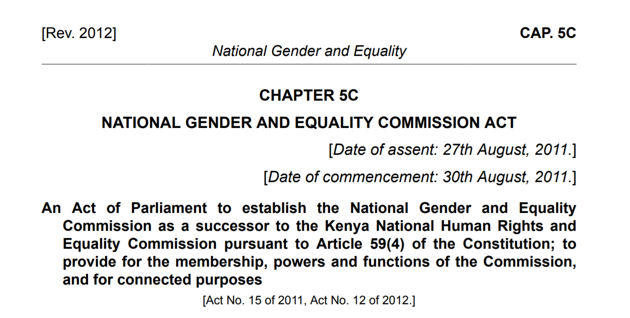
NGEC IS BORN
Article 59 of the Constitution of Kenya (2010) established KNHREC, with an expanded human rights mandate and enhanced powers. It provided that Parliament would enact legislation to give full effect to Article 59 of the Constitution, and any such legislation could restructure the Commission into two or more separate commissions. Subsequently, Parliament was presented with three bills to establish three commissions to give effect to Article 59 of the Constitution: The Kenya National Human Rights Commission Bill, 2011; The Commission on Administrative Justice Bill, 2011; and The National Gender and Equality Commission Bill, 2011.
Although KNCHR was of the view that Parliament’s power to restructure the successor Commission into two or more commissions should be guided by the principle that human rights are universal, interdependent and interrelated, and while it made a spirited case for a single Commission with departments capable of discharging the constitutionally expanded mandate, Parliament eventually passed the three Bills, establishing three commissions – the successor KNCHR, the Commission on Administrative Justice (‘CAJ’); and the National Gender and Equality Commission (NGEC).
The National Gender and Equality Commission (NGEC) was thus established by the National Gender and Equality Commission Act. No. 15 of 2011 pursuant to Article 59 (4) & (5) of the Constitution of Kenya, 2010. The Commission’s mandate is to promote gender equality and freedom from discrimination for all people in Kenya with focus on special interest groups, which include: women, children, youth, persons with disabilities (PWDs), older members of society, minorities and marginalized groups.
Fact-Finding Mission into Ethnic Clashes in Tana River County
In response to media reports in the month of August 2012 as regards ethnic violence in Tana Delta and its environs between two warring communities, NGEC initiated an inquiry into the violence to establish the origin and impact of the violence, especially to the special interest groups. This was the first assignment the Commission undertook upon establishment. In carrying out the inquiry, NGEC carried out fact-finding and follow up missions to ascertain the facts on the ground concerning the violence.
The Commission consulted the provincial administration in the region, held meetings with the elders, women and education officials. There were also visits to the camps of Internally Displaced Persons (IDP), schools and the affected villages in the region. The inquiry culminated in a report with recommendations on how to address the underlying causes of the conflict and thereby preventing recurrence of the same in the future. Read the report here.
Corporate Rebranding from NCGD to NGEC
The National Gender and Equality Commission, NGEC, was formally known as the National Commission on Gender and Development, NCGD under the Ministry of Gender, Children and Social Development. The NGEC is not explicitly mentioned by name in the New Constitution. Rather, it is a 'successor in title' Commission created from the Kenya National Human Rights and Equality Commission, KNHREC
The National Gender and Equality Commission (NGEC) was established by the National Gender and Equality Commission Act No. 15 of 2011 under Article 59(4)-(5) of the Constitution of Kenya (2010), as a successor to the Kenya National Human Rights and Equality Commission (KNHREC). The Commission’s mandate is to promote gender equality and freedom from discrimination for all people in Kenya with a focus on special interest groups, which include: women, children, youth, persons with disabilities (PWDs), older members of society, minorities and marginalized groups. Once the NGEC Act into force, it was necessary to build a corporate identity symbolized by a logo.
The development of the NGEC logo was the subject of a creative concepts competition. The Commission requested for interested bidders to submit proposals of the new NGEC logo. The logo was supposed to illustrate the Commission’s mandate and special interest groups. Several bids were submitted and one was selected to present a variety of logos and colours for approval.
The rationale of the Logo Design and Colour :
- Internationally, purple is a colour for symbolizing women.
- Purple signifies justice and dignity.
- The lime, gold or yellow represents the equality of all special interest groups
- The raised hands symbolize the representation of all persons.
The logo was launched in October 2012.
NGEC Logo Unveiled
The National Gender and Equality Commission, NGEC, was formally known as the National Commission on Gender and Development, NCGD under the Ministry of Gender, Children and Social Development. The NGEC is not explicitly mentioned by name in the New Constitution. Rather, it is a 'successor in title' Commission created from the Kenya National Human Rights and Equality Commission, KNHREC
The National Gender and Equality Commission (NGEC) was established by the National Gender and Equality Commission Act No. 15 of 2011 under Article 59(4)-(5) of the Constitution of Kenya (2010), as a successor to the Kenya National Human Rights and Equality Commission (KNHREC). The Commission’s mandate is to promote gender equality and freedom from discrimination for all people in Kenya with a focus on special interest groups, which include: women, children, youth, persons with disabilities (PWDs), older members of society, minorities and marginalized groups. Once the NGEC Act into force, it was necessary to build a corporate identity symbolized by a logo.
The development of the NGEC logo was the subject of a creative concepts competition. The Commission requested for interested bidders to submit proposals of the new NGEC logo. The logo was supposed to illustrate the Commission’s mandate and special interest groups. Several bids were submitted and one was selected to present a variety of logos and colours for approval.
Voter Education and Observation of the 2013 General Elections
The 2013 General Election in Kenya marked a milestone for being a complex election ever in recent times to have been conducted peacefully. It was a moment Kenyans seized to affirm their solemn declaration for a peaceful and democratic nation. The acceptance and ownership of election results by election losers was spectacular and a fortification of Kenya’s political and democratic maturity. Indeed, Kenya joined other nations in Africa where power has changed hands seamlessly through the conduct of peaceful, democratic multiparty elections.
The Commission conducted an election observation programme to audit and assess the electoral process in fulfilling the twin principles of equality and freedom from all forms of discrimination. From the observation, the Commission concluded that the election was transparent and procedurally legitimate but with challenges that going forward obligated the IEBC, government and other actors to remedy so that the Special Interest Groups (SIG’s) would enjoy constitutionally guaranteed rights like all other persons.
Read the report here
Launch of the Strategic Plan 2013-2015- Our First Mile
In 2013, the Commission set for itself an ambitious 3-year strategic plan dubbed “Our First Mile”, The Strategic plan laid the foundation for the engagement with state and non-state actors, the SIGs and Kenyans at large.
The strategic plan was predicated on 5 key objectives namely:-
1. To create an enabling legal environment to achieve equality in compliance with the Constitution and other written laws and international treaties;
2. To provide a comprehensive and adequate response to Sexual and Gender-Based Violence (SGBV);
3. To mainstream needs and issues of SIGs in development agenda at national and county governance systems and private institutions;
4. To advocate for the financing of substantive equality at all levels;
5. To build an effective, efficient and sustainable institution visible at every level
The strategic objectives as defined in the strategic plan defined the thematic scope on which the Commission’s interventions were situated.
Launch of the Strategic Plan 2013-2015 Video
In 2013, the Commission set for itself an ambitious 3-year strategic plan dubbed “Our First Mile”, The Strategic plan laid the foundation for the engagement with state and non-state actors, the SIGs and Kenyans at large.
The strategic plan was predicated on 5 key objectives namely:-
1. To create an enabling legal environment to achieve equality in compliance with the Constitution and other written laws and international treaties;
2. To provide a comprehensive and adequate response to Sexual and Gender-Based Violence (SGBV);
3. To mainstream needs and issues of SIGs in development agenda at national and county governance systems and private institutions;
4. To advocate for the financing of substantive equality at all levels;
5. To build an effective, efficient and sustainable institution visible at every level
The strategic objectives as defined in the strategic plan defined the thematic scope on which the Commission’s interventions were situated.
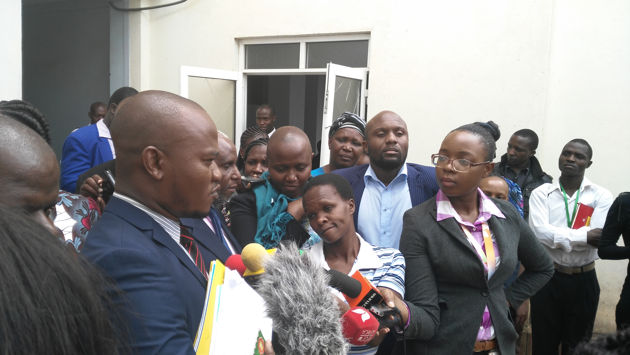
Implementation of the not more than two-thirds gender principle 2014-2016
To avert fatal consequences of noncompliance with the principle after the 2013 elections, the Supreme Court issued an advisory allowing parliament to enact a mechanism to enforce article 81(b) before 27th August 2015. The National Assembly extended this deadline by one more year to 27th August 2016. On 3rd February 2014, the Commission was appointed the convener and secretariat to a Technical Working Group (TWG) established by the Hon Attorney General to find a plausible framework for the two-thirds gender principle.
The Technical Working Group presented, the option of lifting the Provisions of Article 177 (1) (b) and (c) to Articles 97 and 98 of the Constitution of Kenya 2010. The formula was packaged to a Constitutional (Amendment) (No. 4) Bill, 2015. This bill sponsored by the leader of the Majority in the National Assembly Hon Duale was published on 24th July 2015. Despite high levels of public confidence and anticipation in this bill, the motion was defeated on the floor on two occasions by failure to meet the minimum required votes to pass a constitutional amendment bill.
Keeping the Promise to end GBV Advert
From 2013 to 2017 the Commission coordinated National Monthly GBV Sub Cluster Meetings as part of a strategy of providing a comprehensive and adequate response to Sexual and Gender-Based Violence (SGBV);. The Commission launched an online GBV forum that provided a platform for members to discuss trending GBV issues as well as update each other on collective GBV actions. In 2014 the Commission spearheaded a duty bearer’s campaign dubbed ‘Keeping the promise to end GBV’.
The focus of the first year of the campaign was the sensitization of duty bearers, while the subsequent years of the campaign focused on survivors of GBV. The Commission secured the commitment of more than 20 county governments in the ‘Keeping the promise to end GBV’ campaign.
The commitment of the county leadership was of great significance to ensure the implementation of equality principles and adequate preventive and reactive measures relating to GBV in counties.
Read teh Duty Bearers Handbook here
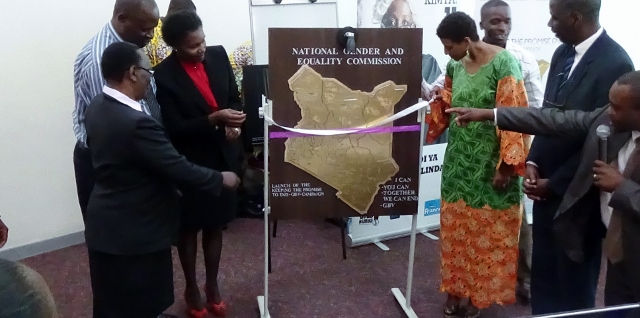
Campaign against Gender-Based Violence
From 2013 to 2017 the Commission coordinated National Monthly GBV Sub Cluster Meetings as part of a strategy of providing a comprehensive and adequate response to Sexual and Gender-Based Violence (SGBV);. The Commission launched an online GBV forum that provided a platform for members to discuss trending GBV issues as well as update each other on collective GBV actions. In 2014 the Commission spearheaded a duty bearer’s campaign dubbed ‘Keeping the promise to end GBV’.
The focus of the first year of the campaign was the sensitization of duty bearers, while the subsequent years of the campaign focused on survivors of GBV. The Commission secured the commitment of more than 20 county governments in the ‘Keeping the promise to end GBV’ campaign.
The commitment of the county leadership was of great significance to ensure the implementation of equality principles and adequate preventive and reactive measures relating to GBV in counties.
Behavioral Change Campaigns-Tubadili, Tusitawi
Given the important mandate bestowed on NGEC, and to achieve NGEC’s priority strategic objectives, the Commission developed an institutional communication strategy that seeks to contribute to enhanced internal efficiency in communication on matters of equality and freedom from discrimination.
To gain national support for the realization of the not more than two-thirds gender principle, the Commission designed a multimedia campaign strategy dubbed “Tubadili, Tusitawi Pamoja” which called for partnership between men and women for sustainable development. The campaign carried a strong community-based advocacy plan and actions around political representations with effect to re-sensitizing citizens, political, faith and community leaders as well as the private sector about the economic and social value of equity and inclusion. The Campaign was launched by H.E President Uhuru Kenyatta in August 2015
President Uhuru Kenyatta's Message on Two Thirds Gender Rule
Given the important mandate bestowed on NGEC, and to achieve NGEC’s priority strategic objectives, the Commission developed an institutional communication strategy that seeks to contribute to enhanced internal efficiency in communication on matters of equality and freedom from discrimination.
To gain national support for the realization of the not more than two-thirds gender principle, the Commission designed a multimedia campaign strategy dubbed “Tubadili, Tusitawi Pamoja” which called for partnership between men and women for sustainable development. The campaign carried a strong community-based advocacy plan and actions around political representations with effect to re-sensitizing citizens, political, faith and community leaders as well as the private sector about the economic and social value of equity and inclusion. The Campaign was launched by H.E President Uhuru Kenyatta in August 2015
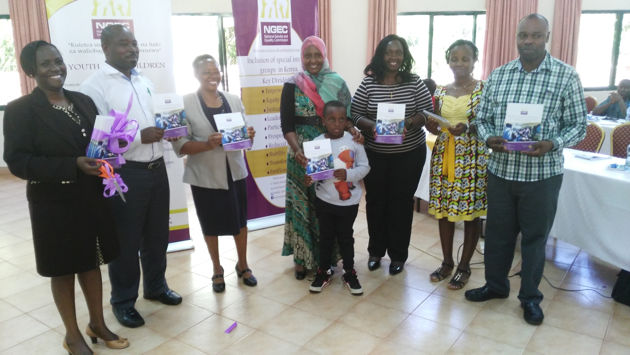
Status of the Boy Child in Kenya
The Commission conducted an assessment in eight counties in Kenya to find out if emerging perceptions on the exclusions of the boy child in the gender equality agenda are valid and identify the key drivers of this exclusion. The assessment was conducted in Kiambu, Kakamega, Kisumu, Embu, Garissa, Kericho, Mombasa and Kilifi counties. The results of the assessment indicated that the boy child is perceived to be lagging behind the girl child in the gender equality agenda.
The majority of the respondents expressed fear that if no intervention is given the boy child would be left behind especially in education since there has been an over-emphasis on the education of the girl child. The report which was launched on December 15 2015 in Nyeri County made a raft of recommendations to National and County Governments as well as to the civil society to implement measures to address the plight of the boy child.
Read the report here.
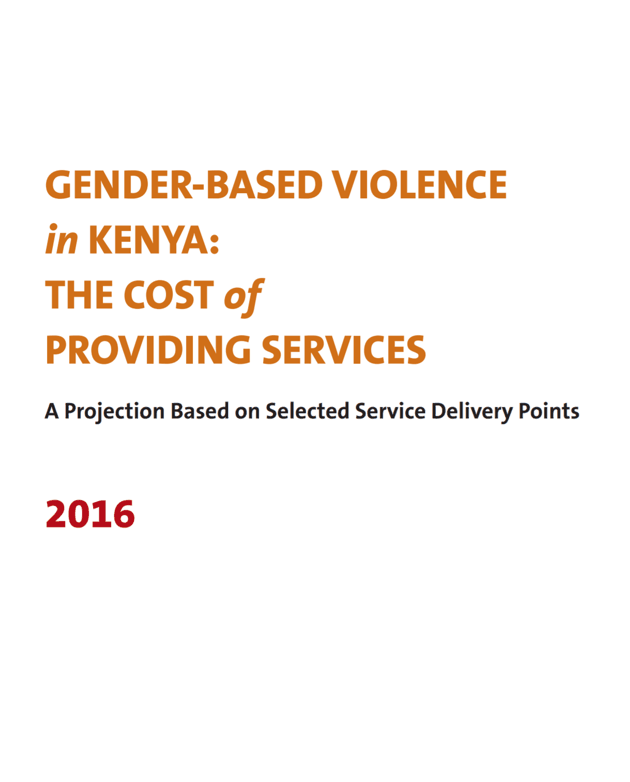
GBV : The Economic Burden on Survivors and Service Provision
In 2016 NGEC released a report following a study that was commissioned to determine the economic burden of gender-based violence (GBV) to survivors in Kenya. The report provides disturbing statistics on the economic burden of gender-based violence to survivors and to the country.
The average cost of medical-related expenses per survivor and family amounted to KES 16,464; reporting the incident to a chief and community structures cost KES 3,111; reporting to police cost KES 3,756; productivity loss from serious injuries amounted to KES 223,476; productivity loss from minor injuries was KES 18,623; and productivity loss from premature mortality from GBV amounted to a massive KES 5,840,664.
Read the reports here:
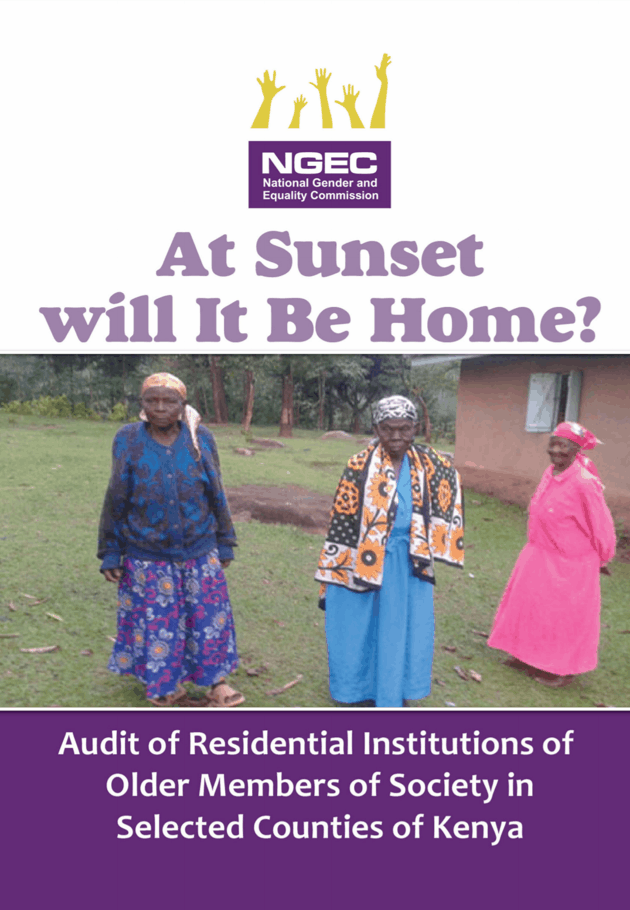
Audit on Residential Institutions for Older Members of Society in Kenya
In 2016 the Commission released an audit report on residential institutions for older members of society in six counties in Kenya highlighting the status of older members of society ‘homes’ and their adherence to the principles of equality and inclusion. The audit revealed that there are very few faith based and private institutions uniquely established for the care of older members of society in Kenya in the counties visited.
Of great concern is that the government does not have a home for the Older Members of Society in the said six counties. The findings of the audit have been instrumental in generating and issuing advisories to both the National and County Governments, private sector and non-state actors on the protection of the rights and privileges of the older members of society in need of care and protection.
Read the report here
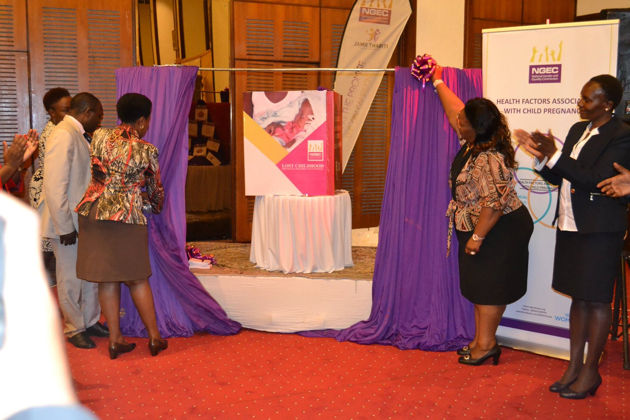
Lost Childhood Report : Public inquiry on child pregnancies
In exercise of its quasi-judicial powers, the Commission on its initiative and with funding from the United Nations Development Fund (UNDP) and Government of Kenya embarked on a public inquiry on child pregnancies. The inquiry hearings were carried out in Busia, Kwale, Homa Bay, Nakuru and Nairobi counties respectively with the view to inquiring into the violations of rights of children and have appropriate recommendations for both State and non-State actors.
The report documented the gravity and pervasive trend of child pregnancies situation in the country and the harrowing ordeal experienced by survivors; often underage girls forced into parenthood and bereft of any capacity material or otherwise to nurture a family as guardians.
The findings on all fronts are that child pregnancy is rampant across the country. The recommendations were based on thematic issues addressed in the report among them Socio-cultural dimensions, stakeholder’s role and involvement, policy and legal framework and institutional bodies and government (county and national) to take objective measures to mitigate child pregnancies in Kenya.
Read the report here
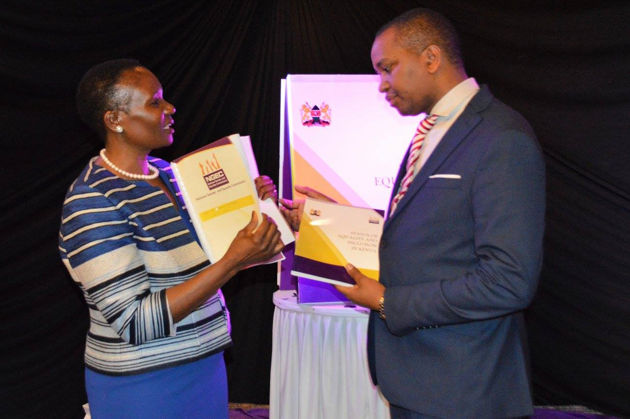
Kenya’s First Status Report on Equality and Inclusion
The development of this report coincided with an important international event – the end of the Millennium Development Goals (MDGs), ushering in the Sustainable Development Goals (SDGs), which offer new global benchmarks for fostering the development agenda. The report was produced at the end of the five years of implementation of Kenya’s Constitution which was promulgated in August 2010.
The report explores the extent to which the principles of equality and inclusion have been implemented in a) employment, b) political representation, c) social protection and d) education, at the National and County government levels, as well as in the rest of the public and private sectors. While equality and inclusion concerns cover the whole population, the report intentionally focused on the four sectors because they influenced the equality and inclusion agenda concerning the six Special Interest Groups (SIGs) identified by the Constitution, i.e. women, youth, persons with disabilities, older members of society, children and the marginalized and minority groups.
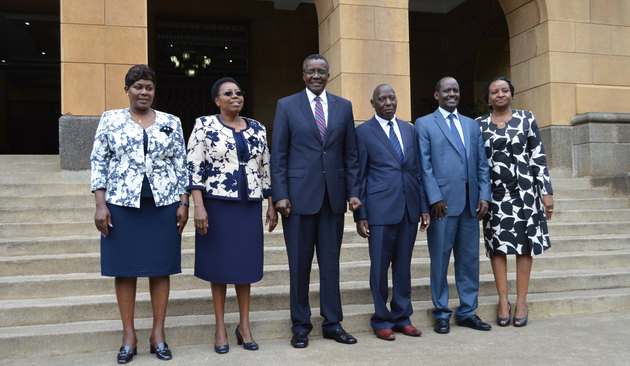
New Chairperson and two commissioners take the oath of office
On August 29 2018, Dr Joyce Mwikali Mutinda was sworn in as Chairperson following the exit of Winfred Lichuma EBS who had served the Commission from 2011 to 2017. Dr Mutinda was sworn alongside Dr Chomba Munyi and Hon. Priscilla Nyokabi to begin a six-year term. Dr Mutinda vowed to champion the course of the boy child and other special interests groups as she steered the Commission into another transformative phase.
Speaking at the Supreme Court of Kenya shortly after being sworn in, Dr Mutinda said she would work to reposition the Commission into an effective monitoring institution in ensuring compliance with the principles of equality and inclusion as prescribed by law. Chief Justice David Maraga urged the newly appointed commissioners to carry out their constitutional responsibilities for the good of the Country
Swearing in Ceremony Video Coverage
Live coverage by NTV
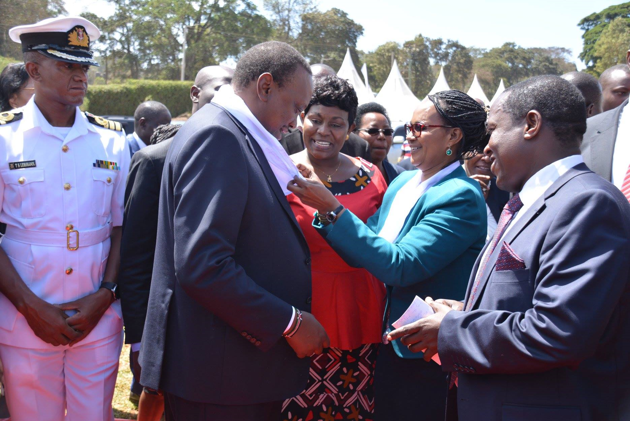
Journey to Gender Parity in Political Representation
In 2018, the Commission released an riveting report of the journey towards the realisation of the not more than two-thirds gender principle. A journey punctuated by epic highs and lows, exasperation, hot tempers and near desperation that morphed into one of the heavily debated and contentious issues post-2010 promulgation of the Constitution.
The report examines the cautious yet bold consultative framework in which the National Gender and Equality Commission while convening the Technical Working Group pursued in trying to broker a practical and politically sound formula for the realisation of the not more than two- thirds gender principle as enshrined in Article 27 of the Constitution of Kenya. The accounts range from both hard to soft lobbying tactics deployed to various influencers.
It exposes the initial naivety that the Technical Working Group strode while seeking a framework within the shortest time possible.
Read the report here
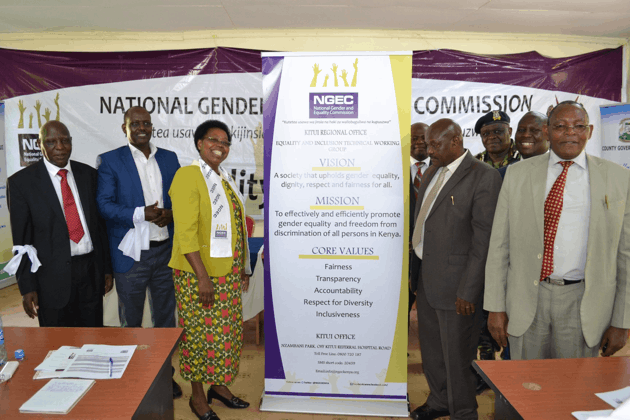
Guidelines for Establishing Equality and Inclusion Technical Groups
In 2018, the Commission made a policy decision to address more comprehensively issues of gender equality and inclusion through well coordinated National and County Level Equality and Inclusion Technical Working Groups. The mandate of the GBV Technical Working Groups was therefore widened to cover all issues of equality and inclusion for special interest groups (SIGs) including women, youth, persons with disability (PWDs), children, youth, older members of society, minority and marginalized groups.
The title of County Gender Based Violence Technical Working Groups was also changed to Equality and Inclusion Technical Working Groups (EITWG). Consequently in 2020, the Commission launched the enhance guidelines to embrace the expanded mandate of the EITWG.
Read guidelines here
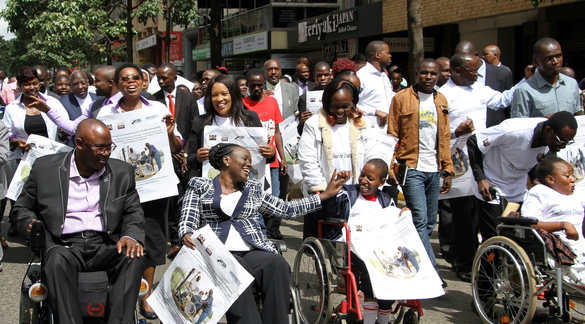
Campaign on Universal Access Launched
On May 20 2019, the Commission in partnership with UN-Habitat, and the Institute of Transportation and Development Policy (ITDP) launched a project campaign titled “Access and Mobility: whose goal was to promote the development of a transport system that is inclusive and accessible to all in Kenya, including persons with disabilities. The project engaged stakeholders in discussions to embed the concept of universal accessibility in the formulation of transport policies, regulations and practice.
As a consequence, Persons with disabilities could soon start enjoying friendly and accessible public transport following a sustained campaign to mainstream disability in the entire public transport system. The ministry of transport is at an advanced stage to roll out bus rapid transit within the Nairobi metropolis which it has assured comes with disability-friendly amenities.
Universal Access and Mobility Campaign Video
Coverage on KBC Prime News
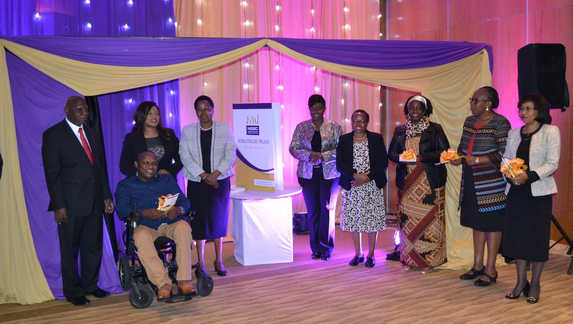
Strategic Plan 2019-2024 Launched
On June 28 2019 the Commission unveiled a new blueprint for the next five years. The Strategic Plan 2019-2024 set an ambitious five-point thematic areas matrix namely: compliance, monitoring and reporting, investigations and redress, public education and mainstreaming, research and knowledge management and institutional capacity that will guide its strategic interventions in discharging our mandate.
These thematic areas have been aligned with the Government’s Big Four Agenda items to ensure Special Interest Groups are part and parcel of the development and implementation of national goals.
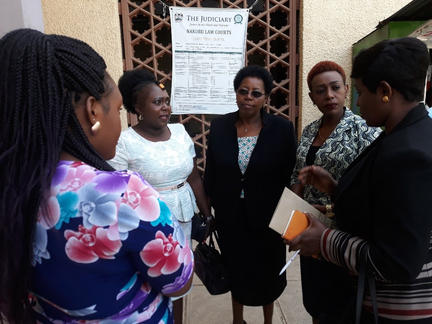
NGEC wins landmark case on equality of MCAs
NGEC savoured a well-deserved victory in a protracted legal battle pitting the Commission and the County Assembly of Nakuru, in Petition No. 1 of 2019 after the High Court in Nakuru affirmed the equality of nominated members of county assemblies. The Commission had moved to court seeking the determination on a matter in which the Nakuru County Assembly passed a motion effectively de-whipping nominated members serving as Chairpersons and Vice-Chairpersons in different committees.
The case also concerned a circular issued by the Salaries and Remunerations Commission (SRC) stating that nominated MCA’s do not have a defined constituency and therefore capped their mileage allowance to the standard mileage provision. In a landmark judgement delivered by Justice Joel Ngugi, the High Court declared nominated MCAs to have equal opportunities, responsibilities and privileges just like their elected counterparts effectively quashing the decision of the County Assembly. “Nominated MCAs represent special interest groups especially the vulnerable, minority and historically marginalized groups such as women, youth, persons with disabilities and racial minorities”. read the judgement in part.
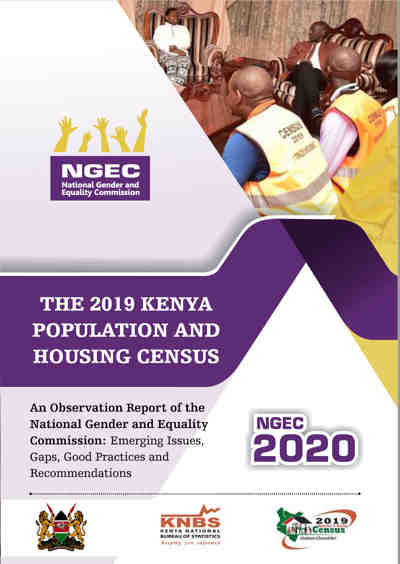
The 2019 Kenya Population and Housing Census Observation
The Commission observed for the first time in Kenya, the inclusion and participation of special interest groups (SIG’s) in the 2019 Kenya Population and Housing Census. A report “The 2019 Kenya Population and Housing Census report”- An Observation Report of the National Gender and Equality Commission: Emerging Issues, Gaps Good Practices and Recommendation enumeration has been published.
Read the report here
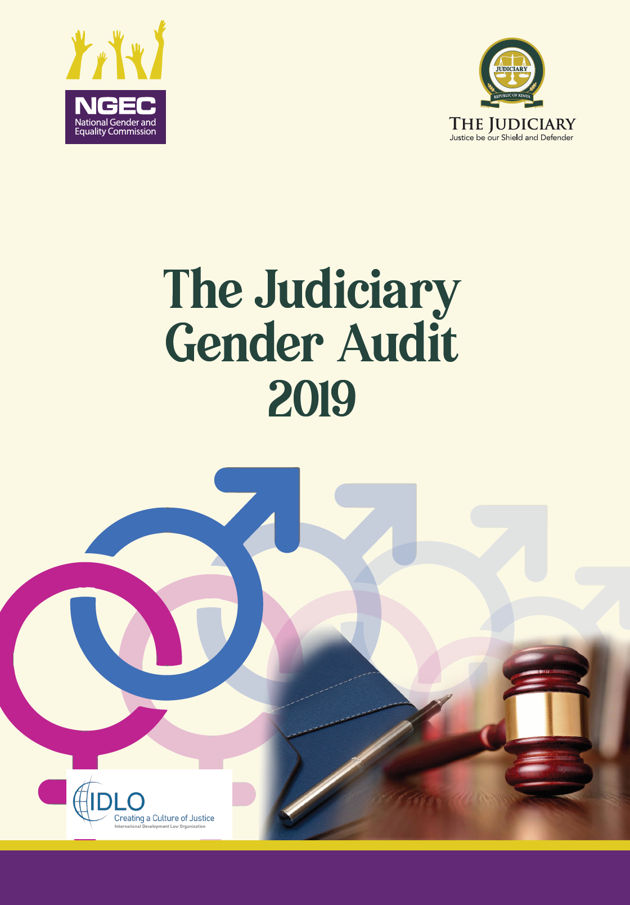
Status of Equality in the Judiciary Report Launched
On August 11 2020, the Commission in collaboration with the International Development Law Organization IDLO released an audit report detailing the status of equality in the Judiciary. The Gender Audit sought to analyze the gender sensitivity and responsiveness of the Judiciary as a whole in its internal operations and delivery on its external mandate. This involved looking at how the Judiciary managed its workforce and how it delivered justice to its constituents.
The Gender Audit revealed that the Judiciary is gradually and progressively becoming receptive to the principles of gender equality and non-discrimination. Most importantly, the audit found out that a body of constitutional jurisprudence on gender equality has started to develop which recognizes the historical gender discrimination that has disadvantaged women in Kenya. This is the necessary step in applying a purposive approach to interpreting gender equality rights and realizing substantive equality for both women and men.
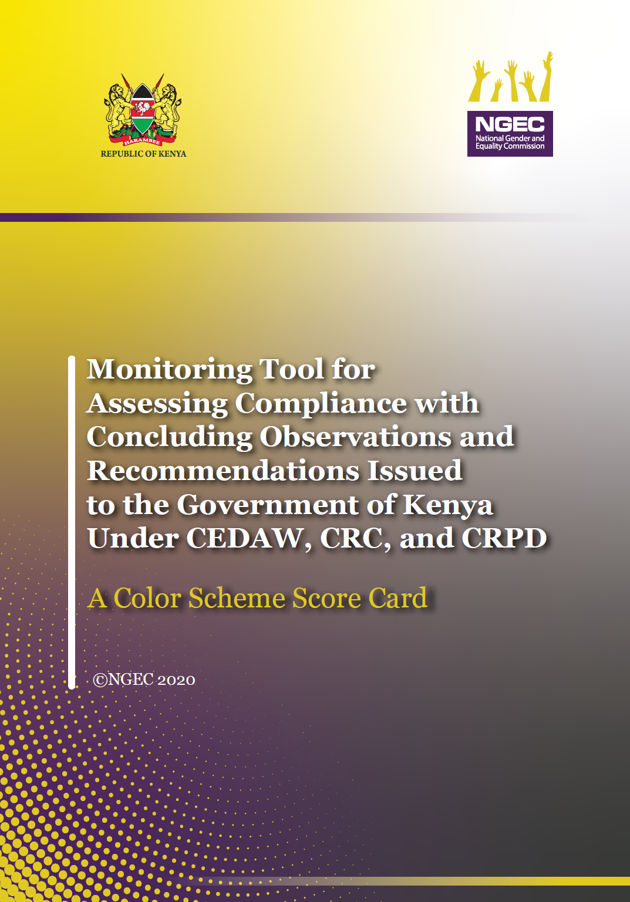
Developed Mechanisms for Monitoring International Treaties and Conventions
To enhance compliance in line with its mandate in section 8 © of the National Gender and Equality Commission Act, 2011, the Commission in 2019, facilitated the development of Mechanisms for Monitoring Implementation of International and Regional Commitments:
a) Scorecard for the Evaluation of Progress made by the State in the implementation of the Protocol to the African Charter on Human and Peoples’ Rights On the Rights of Women in Africa (Maputo Protocol).: and
b) Tool for Assessing Compliance with Concluding Observations and Recommendations issued to the Government of Kenya under the Convention on the Elimination of all Forms of Discrimination Against Women (CEDAW), Convention on the Rights of the Child (CRC), and The Convention on the Rights of Persons with Disabilities (CRPD)
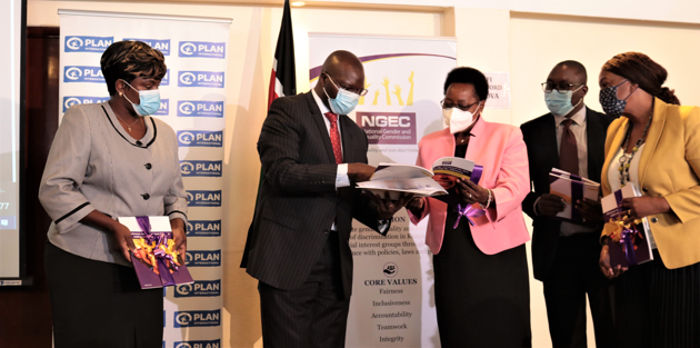
Launch of the Minimum Age of Consent for Sex Report
On March 17 2021, the Commission released a report on the Minimum Age of Consent for Sex. Age of consent for sex has been a long winding debate, whose conversations touch majorly on children. In Kenya, the debate on the age of consent for sex was sparked by the Court of Appeal proposal in March 2019 that invited national discussions on mechanisms for dealing with children offenders under provisions within the Sexual Offences Act 2016 while maintaining the best interest of the child.
The matter constitutes the ‘dilemma’. In fulfilment of its mandate, NGEC organized a forum drawing stakeholders from different public and private sectors including; academia, justice, education, health, children rehabilitation institutions, children, among others to discuss the substantive issues on the age of consent for sex, anticipated consequences of either decision and make policy recommendations to the State. The report concluded that lowering the age of consent for sex is not in the best interest of our children, as it may lead to an increase in sexual exploitation whose consequences includes teenage pregnancy, which robs girls of their childhood, education and future.
Read the report here

10-year milestone
A decade of epic highs and unforgettable lows. We have been working to promote gender equality and non-discrimination of all persons in Kenya
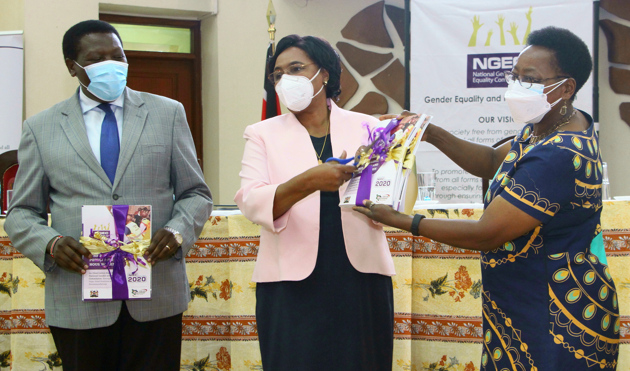
NGEC@10 Celebrations
NGEC held a colourful ceremony at Kenya School of Governmet and virtually on Zoom. Several publications were launched and can be accessed here